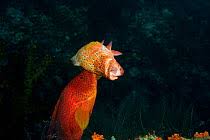
The dragon, a symbol of power, mystery, and divine forces in Chinese culture, has held a significant role in the country’s rich folklore for centuries. In many Chinese myths and legends, dragons are not only seen as protectors or fearsome creatures but also as symbols of love and sacrifice, themes that resonate deeply within the fabric of Chinese tradition. Throughout history, these magnificent creatures have been woven into stories that reflect the complexities of human emotions, especially in the realms of love and sacrifice.
This article delves into the role of dragons in Chinese folktales that emphasize love, sacrifice, and the intertwining of these themes with Chinese cultural values. From stories of human-turned-dragons to dragons protecting love and making the ultimate sacrifice, these ancient narratives continue to inspire generations, imbuing dragons with an emotional and symbolic power that transcends their fearsome appearances.
1. The Symbolism of Dragons in Chinese Culture
Before exploring specific folktales, it’s essential to understand the symbolic meaning of dragons in Chinese culture. In China, the dragon is a symbol of power, authority, and cosmic balance. The dragon’s relationship to water and the natural world grants it dominion over rivers, seas, and the very elements of life. While many cultures view dragons as destructive and dangerous, in Chinese culture, the dragon embodies balance, prosperity, and good fortune.
In traditional Chinese society, dragons were believed to embody both celestial and earthly realms, often associated with the emperor, who was considered the “Son of Heaven.” The dragon was a symbol of imperial authority and divine right, but also a guardian of love, fate, and harmony. Thus, dragons were often depicted in tales where they protect the sacred or fulfill emotional duties, especially those tied to love and sacrifice.
2. The Dragon and the Myth of the Cowherd and the Weaver Girl
One of the most iconic and beloved love stories in Chinese folklore is that of the Cowherd and the Weaver Girl, known as “Niulang and Zhinü” in Chinese. This poignant tale centers around a love that transcends the heavens, with the story ultimately highlighting the sacrifices both lovers make for each other.
The Myth of Niulang and Zhinü
Niulang, a humble cowherd, falls in love with Zhinü, the beautiful daughter of the Jade Emperor, who is a weaver fairy. Their love, however, is forbidden because Zhinü is a celestial being. In defiance of the rules, Zhinü and Niulang marry and live a happy life on Earth, but their union angers the Jade Emperor. As a result, Zhinü is taken back to heaven, and the lovers are separated by the Milky Way, forced to live on opposite sides of the river.
In the story, the dragon plays an important role as a celestial being that aids the lovers. The dragon appears to help Niulang cross the Milky Way to reunite with his love. In some versions of the story, it is said that the dragon, understanding the depth of their love, sacrifices itself to create a bridge over the Milky Way, allowing Niulang and Zhinü to meet once a year on the seventh day of the seventh month, which is celebrated as Qixi Festival (Chinese Valentine’s Day).
Themes of Love and Sacrifice
The myth of Niulang and Zhinü is a poignant example of how dragons in Chinese folklore are connected with themes of love and sacrifice. In the story, the dragon sacrifices its own life to help reunite the lovers, symbolizing the power of selflessness and devotion. The dragon here is not just a creature of fear, but one that demonstrates love’s willingness to transcend boundaries, even if it requires great sacrifice.
3. The Dragon’s Role in Protecting Forbidden Love
In several Chinese folktales, dragons are often protectors of forbidden love. In these stories, dragons are not only seen as guardians of relationships but also as symbols of loyalty and the lengths to which one is willing to go for love.
The Dragon and the Princess
One such story involves a dragon who falls in love with a human princess. In this tale, the princess is promised to a prince, but her heart belongs to a dragon who has been transformed into a man. This dragon-turned-man must prove his worthiness to the princess’s family and her people, facing great trials and challenges along the way.
The dragon’s devotion to the princess leads him to undergo immense sacrifices, which ultimately result in him reclaiming his true form as a dragon, a symbol of power and purity. In some variations, the princess chooses the dragon over the prince, symbolizing how love transcends appearances and societal expectations.
Themes of Loyalty and Devotion
These stories echo themes of loyalty and devotion, with the dragon’s sacrifice illustrating the lengths to which one will go for love. In these tales, dragons are not depicted as mere supernatural creatures but as embodiments of loyalty, passion, and the willingness to sacrifice for the one they love.
4. The Dragon in Love and Sacrifice in the Story of the White Snake
Another famous Chinese legend where dragons play a pivotal role in love and sacrifice is the story of the White Snake. The tale revolves around a beautiful white snake spirit, who transforms into a woman and falls in love with a mortal man named Xu Xian. However, their love is not accepted by society and is tested by various forces, including powerful monks and a dragon king.
The White Snake and the Dragon King
In this story, the White Snake is a dragon spirit who takes on human form to experience love. She is an embodiment of both beauty and danger, and her love for Xu Xian is pure but forbidden. The dragon king, a powerful being from the seas, becomes an antagonist in the story, standing in the way of their love. He symbolizes the natural forces that prevent the union of mortal and immortal beings.
In some versions of the story, the White Snake sacrifices herself to protect her lover, overcoming the forces of nature and society. The dragon king, in this version, is eventually overpowered by the power of love and sacrifice. The tale concludes with the White Snake’s willingness to risk everything for love, echoing the sacrificial nature of the dragon.
Themes of Fate and Transcendence
The story of the White Snake is deeply connected to the themes of fate, transcendence, and the power of love to overcome obstacles. The dragon, in its various forms, is associated with powerful beings and forces that challenge love, but ultimately, love’s strength triumphs through sacrifice. The White Snake’s transformation into a dragon and her willingness to risk everything for love highlight how sacrifice can lead to transcendence, both in the supernatural and in human affairs.
5. The Dragon as a Symbol of Transformation and Sacrifice
In many of these folktales, the dragon is a symbol of transformation, reflecting the deeper theme of self-sacrifice for the greater good. Dragons in Chinese culture are often seen as beings that can transcend their natural forms to become something greater, often with the goal of protecting or preserving love.
Transformation and Rebirth
The ability of dragons to transform—either from a human into a dragon or vice versa—is a key element in many love stories. This transformation often requires great sacrifice, and the dragon becomes a metaphor for the power of love to change not only the individuals involved but also the fate of those around them. The idea of love as a transformative force echoes throughout Chinese mythology, with the dragon playing a central role in the rebirth and renewal of these love stories.
6. Conclusion
The role of dragons in Chinese folklore, particularly in stories about love and sacrifice, illustrates the profound connections between mythology, culture, and human emotions. Dragons in these tales are not just mythical creatures—they are embodiments of the complexities of love, devotion, loyalty, and the willingness to sacrifice for those we cherish. From the story of Niulang and Zhinü to the tale of the White Snake, dragons continue to captivate and inspire, offering a timeless reminder of the transformative power of love and the lengths one will go to for the ones they hold dear.
The enduring presence of the dragon in these stories serves as a testament to its significance in Chinese culture—not just as a symbol of power and mysticism, but as a representation of the deep emotional connections that define the human experience. Through the dragon’s sacrifices, Chinese folklore teaches us that love is not only about passion and joy but also about overcoming trials and making profound sacrifices, much like the legendary creatures that grace these ancient stories.

